BMW 1 Series vs Ford Kuga - Differences and prices compared
Compare performance (300 HP vs 243 HP), boot space and price (28800 £ vs 34200 £ ) at a glance. Find out which car is the better choice for you – BMW 1 Series or Ford Kuga?
Costs and Efficiency:
When it comes to price and running costs, the biggest differences usually appear. This is often where you see which car fits your budget better in the long run.
BMW 1 Series has a a bit advantage in terms of price – it starts at 28800 £ , while the Ford Kuga costs 34200 £ . That’s a price difference of around 5442 £.
Fuel consumption also shows a difference: Ford Kuga manages with 2.80 L and is therefore clearly more efficient than the BMW 1 Series with 4.30 L. The difference is about 1.50 L per 100 km.
Engine and Performance:
Power, torque and acceleration say a lot about how a car feels on the road. This is where you see which model delivers more driving dynamics.
When it comes to engine power, the BMW 1 Series has a slightly edge – offering 300 HP compared to 243 HP. That’s roughly 57 HP more horsepower.
In acceleration from 0 to 100 km/h, the BMW 1 Series is significantly quicker – completing the sprint in 4.90 s, while the Ford Kuga takes 7.30 s. That’s about 2.40 s faster.
In terms of top speed, the BMW 1 Series performs slightly better – reaching 250 km/h, while the Ford Kuga tops out at 200 km/h. The difference is around 50 km/h.
There’s also a difference in torque: BMW 1 Series pulls noticeable stronger with 400 Nm compared to 240 Nm. That’s about 160 Nm difference.
Space and Everyday Use:
Beyond pure performance, interior space and usability matter most in daily life. This is where you see which car is more practical and versatile.
Both vehicles offer seating for 5 people.
In curb weight, BMW 1 Series is hardly perceptible lighter – 1465 kg compared to 1526 kg. The difference is around 61 kg.
In terms of boot space, the Ford Kuga offers slight more room – 412 L compared to 380 L. That’s a difference of about 32 L.
In maximum load capacity, the Ford Kuga performs distinct better – up to 1534 L, which is about 334 L more than the BMW 1 Series.
When it comes to payload, Ford Kuga slight takes the win – 550 kg compared to 510 kg. That’s a difference of about 40 kg.
Who comes out on top?
Overall, the Ford Kuga shows itself to be offers a more balanced package and secures the title of DriveDuel Champion.
It convinces with the more balanced overall package and proves to be the more versatile choice for everyday use.
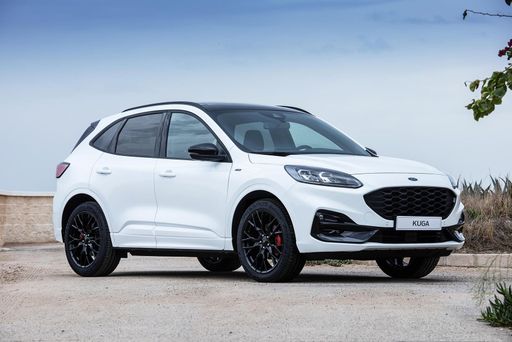
Ford Kuga
Costs and Consumption
View detailed analysis
Engine and Performance
View detailed analysis
Dimensions and Body
View detailed analysis
BMW 1 Series
The BMW 1 Series is a compact premium hatchback that injects a proper sense of driving fun into everyday life, with sharp handling and a cabin that punches above its class. It’s a great pick for buyers who want sporty manners without losing practicality, and yes, you’ll still get that unmistakable BMW grin behind the wheel.
details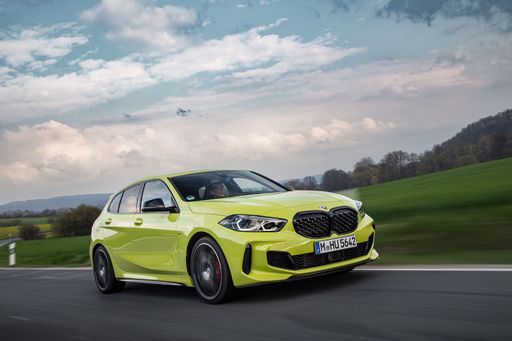
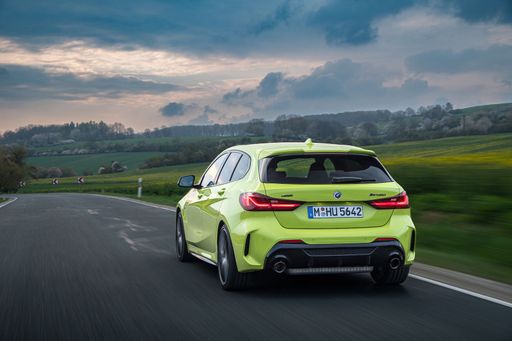
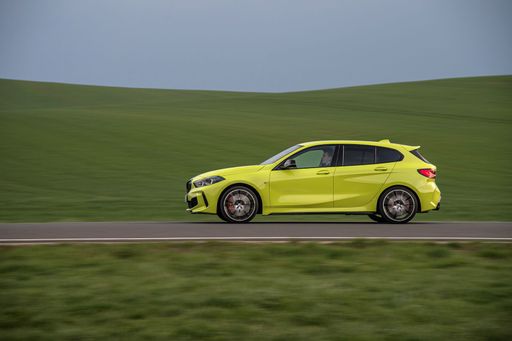
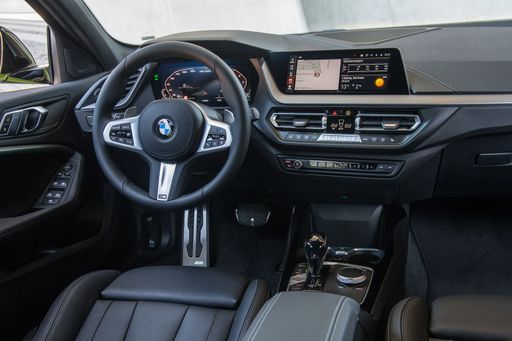
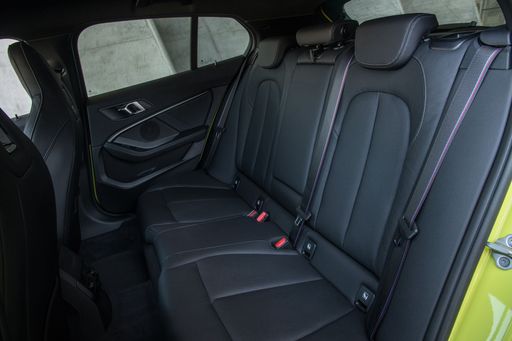
Ford Kuga
The Kuga is Ford’s adaptable family SUV that blends usable space with a surprisingly lively driving character, making daily commutes and weekend escapes equally enjoyable. With smart interior packaging, an easy-to-use infotainment setup and composed road manners, it’s a sensible choice for buyers who want a bit of fun without the fuss.
details
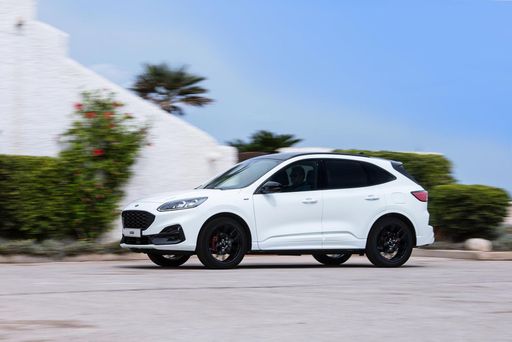

Costs and Consumption |
|
|---|---|
|
Price
28800 - 51100 £
|
Price
34200 - 46300 £
|
|
Consumption L/100km
4.3 - 7.6 L
|
Consumption L/100km
2.8 - 6.8 L
|
|
Consumption kWh/100km
-
|
Consumption kWh/100km
-
|
|
Electric Range
-
|
Electric Range
68 km
|
|
Battery Capacity
-
|
Battery Capacity
1.1 - 14.4 kWh
|
|
co2
112 - 173 g/km
|
co2
55 - 154 g/km
|
|
Fuel tank capacity
49 L
|
Fuel tank capacity
42 - 54 L
|
Dimensions and Body |
|
|---|---|
|
Body Type
Hatchback
|
Body Type
SUV
|
|
Seats
5
|
Seats
5
|
|
Doors
5
|
Doors
5
|
|
Curb weight
1465 - 1625 kg
|
Curb weight
1526 - 1859 kg
|
|
Trunk capacity
300 - 380 L
|
Trunk capacity
412 L
|
|
Length
4361 mm
|
Length
4604 - 4645 mm
|
|
Width
1800 mm
|
Width
1882 mm
|
|
Height
1459 mm
|
Height
1673 - 1681 mm
|
|
Max trunk capacity
1135 - 1200 L
|
Max trunk capacity
1534 L
|
|
Payload
475 - 510 kg
|
Payload
541 - 550 kg
|
Engine and Performance |
|
|---|---|
|
Engine Type
Diesel, Petrol MHEV, Diesel MHEV, Petrol
|
Engine Type
Petrol, Full Hybrid, Plugin Hybrid
|
|
Transmission
Automatic
|
Transmission
Manuel, Automatic
|
|
Transmission Detail
Dual-Clutch Automatic
|
Transmission Detail
Manual Gearbox, CVT, Automatic Gearbox
|
|
Drive Type
Front-Wheel Drive, All-Wheel Drive
|
Drive Type
Front-Wheel Drive, All-Wheel Drive
|
|
Power HP
122 - 300 HP
|
Power HP
150 - 243 HP
|
|
Acceleration 0-100km/h
4.9 - 9.8 s
|
Acceleration 0-100km/h
7.3 - 9.9 s
|
|
Max Speed
210 - 250 km/h
|
Max Speed
195 - 200 km/h
|
|
Torque
230 - 400 Nm
|
Torque
240 Nm
|
|
Number of Cylinders
3 - 4
|
Number of Cylinders
3 - 4
|
|
Power kW
90 - 221 kW
|
Power kW
111 - 178 kW
|
|
Engine capacity
1499 - 1998 cm3
|
Engine capacity
1496 - 2488 cm3
|
General |
|
|---|---|
|
Model Year
2024
|
Model Year
2025
|
|
CO2 Efficiency Class
D, C, F
|
CO2 Efficiency Class
E, D, B
|
|
Brand
BMW
|
Brand
Ford
|
What drive types are available for the BMW 1 Series?
The BMW 1 Series is offered with Front-Wheel Drive or All-Wheel Drive.




